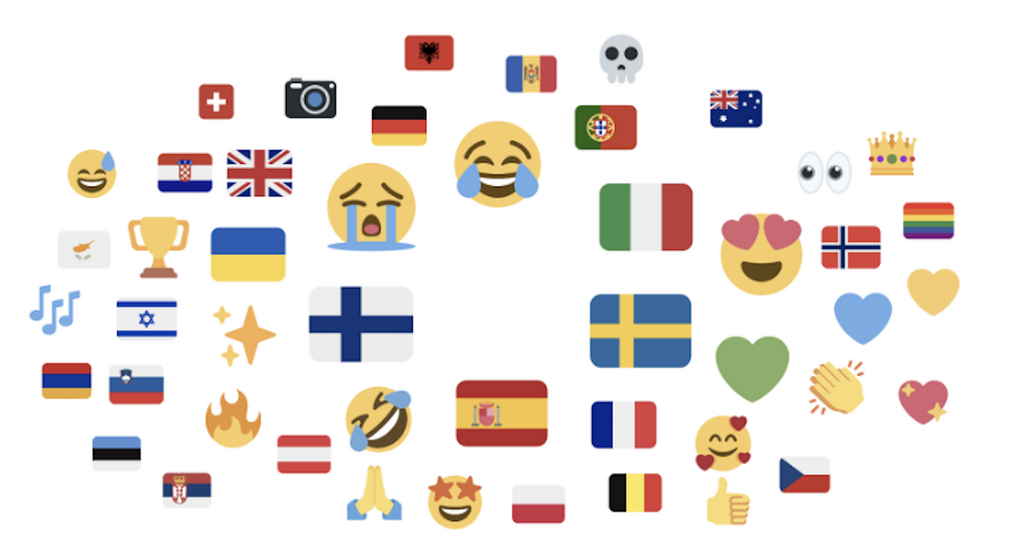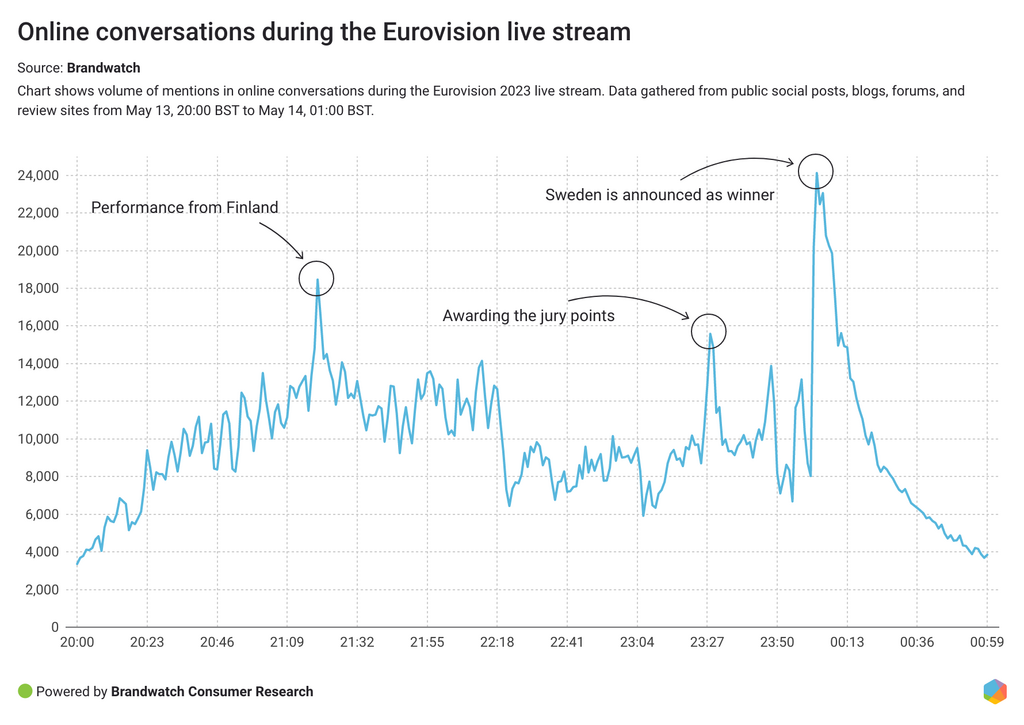The Eurovision Song Contest is a phenomenon.
It's the biggest music competition show in the world, with hundreds of millions of people either attending the show or watching it from home.
Contestants from 26 countries competed on Saturday for the Eurovision trophy and to host next year's event. Last year, Ukraine won but, for obvious reasons, couldn’t host this year’s event. Instead, Eurovision was held in Liverpool in the UK.
What are the highlights of the Eurovision Song Contest 2023? How did the event go down online? We have the social data.
A quick note on methodology
We used Brandwatch Consumer Research to analyze the online conversations during the Eurovision live stream on May 13. We gathered data from Twitter, review sites, blogs, Reddit, forums, news sources, Facebook, YouTube comments, and Tumblr.
The Eurovision online conversations
During the event, Eurovision received over 3.3 million mentions on social media platforms. While still a significant number, this is a 13% decrease from last year's event, which generated 3.8 million mentions The most-used emojis associated with Eurovision were the Finnish, Spanish, Italian, and Swedish flags. Also popular were the crying emoji (😭), the tears of joy emoji (😂), and the heart-eyes emoji (😍).
Joy was the most prominent emotion expressed in posts online during the event." 42% of emotion-categorized mentions were joyful. Viewers talked about their love for the Eurovision event in general or took to social to root for their favorite artists and countries.
The hashtag #Eurovision gained more than 5.3 billion impressions on Twitter during the time it aired, while #eurovision2023 gained 4.2 billion impressions.
Here are the top-used hashtags in the Eurovision online conversations:
- #eurovision – 623k tweets
- #eurovision2023 – 567k tweets
- #esc2023 – 67k tweets
- #escita – 39k tweets
- #eurovisionrtve – 26k tweets
The most talked-about moments of Eurovision 2023
What were the most talked about moments from the event? Looking at the online conversation over time, one peak that stands out: When Sweden was announced as the winner.
The second-highest peak was the performance of Käärijä from Finland. His party song „Cha Cha Cha“ was one of the most talked about moments, and the audience loved his show.
Another moment that got people talking was the announcement of the jury points. The jury points were announced before the audience votes, and viewers discussed the results online.
The hosts
No Eurovision without hosts. The show was hosted by Alesha Dixon, Graham Norton, Julia Sanina, and Hannah Waddingham.
Ted Lasso actress Hannah Waddingham received 40% of all host-related mentions and clearly won the hearts of the audience. She was praised for her charm and excellent language skills and was often referred to as the "real winner" of Eurovision. She received several "twelve points" in online comments and was hailed as the "Queen of Eurovision."
Comedian Graham Norton was a big hit too and came in second with 37% of all host-related mentions.
Online mentions about the hosts during the show:
- Hannah Waddingham: 16,5k mentions
- Graham Norton: 15,3k mentions
- Alesha Dixon: 5,7k mentions
- Julia Sanina: 4k mentions.
The contestants
Now, on to the contestants.
Which artists and performances from the 26 participating countries were the most talked-about online?
In terms of online conversation, there's a clear winner: Käärijä from Finland.
The singer received 22% of all mentions related to the contestants. People loved his song and performance, which was also reflected in the public vote, where he got over 300 points from the viewers.
This makes his song the second most-voted-for song in the history of the Eurovision Song Contest.
The second most popular contestant was Loreen, with 20% of the public votes. The Swedish singer won this Eurovision with her catchy pop song "Tattoo." In 2012, she won the contest with her song "Euphoria," making her only the second artist to win Eurovision twice.
And people loved her performance online too. Loreen had the highest engagement during her stage performance rounding up a volume of 17,1k mentions, 2282% higher than usual during the show.
In third and fourth place were Italy and Spain with 11% of the public votes each. While the UK co-hosted a fantastic show with Ukraine, they weren't as lucky in the competition. They finished second to last, ahead of just Germany. But the viewers took it with a sense of humor and declared to continue the tradition.
Roundup
So there you have it. Eurovision is a huge event every year where countries come together and celebrate music.
Next year's Eurovision will be held in the winning country Sweden. It will also be the 50th anniversary of Swedish ABBA's Eurovision win in 1974 with their song "Waterloo."
There’ll be plenty to celebrate, and viewers will be posting online to share their opinions. Brands and event-related companies of all kinds can monitor these conversations with advanced social listening tools – like Brandwatch Consumer Research – to understand perceptions, sentiments, and analyze key trends around those large-scale events.






